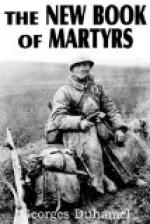Four operation-wards had been arranged. The wounded were brought in unceasingly, and a grave and prudent mind pronounced upon the state of each, upon his fate, his future. ... Confronted by the overwhelming flood of work to be done, the surgeon, before seizing the knife, had to meditate deeply, and make a decision as to the sacrifice which would ensure life, or give some hope of life. In a moment of effective thought, he had to perceive and weigh a man’s whole existence, then act, with method and audacity.
As soon as one wounded man left the ward, another was brought in; while the preparations for the operation were being made, we went to choose among and classify the patients beforehand, for many needed nothing more; they had passed beyond human aid, and awaited, numb and unconscious, the crowning mercy of death.
The word “untransportable” once pronounced, directed all our work. The wounded capable of waiting a few hours longer for attention, and of going elsewhere for it were removed. But when the buzz of the motors was heard, every one wanted to go, and men begging to be taken away entered upon their death agony as they assured us they felt quite strong enough to travel. ...
Some told us their histories; the majority were silent. They wanted to go elsewhere ... and above all, to sleep, to drink. Natural wants dominated, and made them forget the anguish of their wounds. ...
I remember one poor fellow who was asked if he wanted anything. ... He had a terrible wound in the chest, and was waiting to be examined. He replied timidly that he wanted the urinal, and when the orderly hurried to him bringing it, he was dead.
The pressure of urgent duty had made us quite unmindful of the battle close by, and of the deafening cannonade. However, towards evening, the buildings trembled under the fury of the detonations. A little armoured train had taken up its position near us. The muzzle of a naval gun protruded from it, and from moment to moment thrust out a broad tongue of flame with a catastrophic roar.
The work was accelerated at the very height of the uproar. Rivers of water had run along the corridors, washing down the mud, the blood and the refuse of the operation-wards. The men who had been operated on were carried to beds on which clean sheets had been spread. The open windows let in the pure, keen air, and night fell on the hillsides of the Meuse, where the tumult raged and lightnings flashed.
Sometimes a wounded man brought us the latest news of the battle. Between his groans, he described the incredible bombardment, the obstinate resistance, the counter-attacks at the height of the hurly-burly.
All these simple fellows ended their story with the same words, surprising words at such a moment of suffering:
“They can’t get through now. ...
Then they began to moan again.
During the terrible weeks of the battle, it was from the lips of these tortured men that we heard the most amazing words of hope and confidence, uttered between two cries of anguish.




